THIS IS A BORZOI BOOK PUBLISHED BY ALFRED A. KNOPF Copyright 2012 by Verlyn Klinkenborg All rights reserved. Published in the United States by Alfred A. Knopf, a division of Random House, Inc., New York, and in Canada by Random House of Canada Limited, Toronto. www.aaknopf.com Knopf, Borzoi Books, and the colophon are registered trademarks of
Random House, Inc. Grateful acknowledgment is made to Farrar, Straus and Giroux, LLC, for permission to reprint excerpts from the following: John Wayne:
A Love Song from
Slouching Towards Bethlehem by Joan Didion.
Copyright 1966, 1968, renewed 1996 by Joan Didion.
Reprinted by permission of Farrar, Straus and Giroux, LLC.
Library of Congress Cataloging-in-Publication Data
Klinkenborg, Verlyn.
Several short sentences about writing / Verlyn Klinkenborg. 1st ed.
p. cm.
This is a Borzoi Book.
eISBN: 978-0-307-95849-5
1. Authorship. 2. I. I.
Title.
PN151.K47 2012
808dc23 2011050745 Jacket design by Jason Booher v3.1 To John, Jill, and Jake The subject is there only by the grace of the authors language. Joyce Carol Oates
PROLOGUE
This is a book of first steps. Their meaning will change as your experience changes. This book contains the bones of many arguments and observationsa vertebra here, a mandible therebut the whole skeleton is what you make of it. Youll find as much about thought and perception here as you will about language. There are no rules, only experiments.
The premise of this book is that most of the received wisdom about how writing works is not only wrong but harmful. This is not an assumption. Its a conclusion. Like most received wisdom, what people think they know about writing works in subtle, subterranean ways. For some reason, we seem to believe most strongly in the stuff that gets into our heads without our knowing or remembering how it got there. What we think we know about writing sounds plausible.
It confirms our generally false ideas about creativity and genius. But none of this means its true. What Ive learned about writing Ive learned by trial and error, which is how most writers have learned. I had to overcome my academic training, which taught me to write in a way that was useless to me (and almost everyone else). Unlearning what I learned in collegeteaching myself to write wellis the basis of what I know. So is a lifetime of reading and a love of language.
The rest comes from years of writing and teaching writing. The ideas and suggestions in this book have been tested again and again, by me, by my students, and by writers who have figured these things out for themselves. A couple of cautions before you begin. This book isnt meant to replace the received wisdom. Received means untested, untried, repeated out of habit. Everything in this book is meant to be tested all over again, by you.
You decide what works for you. This is perhaps the most important thing I have to say. Theres no gospel here, no orthodoxy, no dogma. Part of the struggle in learning to write is learning to ignore what isnt useful to you and pay attention to what is. If that means arguing with me as you read this book, so be it. This is a book full of starting points.
Perhaps theyll help you find enough clarity in your own mind and your own writing to discover what it means to write. I dont mean write the way I do or write the way they do. I mean write the way you do. Heres a starting point. You may have no idea what way you write. Note: I use the word piece a lot. Note: I use the word piece a lot.
It means whatever youre writing, whatever the genre, whatever the length.
Contents
Here, in short, is what I want to tell you. Know what each sentence says, What it doesnt say, And what it implies. Of these, the hardest is knowing what each sentence actually says. At first, it will help to make short sentences, Short enough to feel the variations in length. Leave space between them for the things that words cant really say.
Pay attention to rhythm, first and last. Imagine it this way: One by one, each sentence takes the stage. It says the very thing it comes into existence to say. Then it leaves the stage. It doesnt help the next one up or the previous one down. It doesnt wave to its friends in the audience Or pause to be acknowledged or applauded.
It doesnt talk about what its saying. It simply says its piece and leaves the stage. This isnt the whole art of writing well. It isnt even most of it. But its a place to begin, and to begin from again and again.  Short sentences arent hard to make.
Short sentences arent hard to make.
The difficulty is forcing yourself to keep them short. There are innumerable ways to write badly. The usual way is making sentences that dont say what you think they do. Which can the reader possibly believe? Your sentences or you? The only link between you and the reader is the sentence youre making. Theres no sign of your intention apart from the sentences themselves, And every sentence has its own motives, its own commitments, Quite apart from yours. It adheres to a set of rulesgrammar, syntax, the history and customs of the language, a world of echoes and allusions and social cuesthat pay no heed to your intentions, If you dont heed those rules.
Its hard to pay attention to what your words are actually saying. As opposed to what you mean to say or what you think theyre saying. Knowing what youre trying to say is always important. But knowing what youve actually said is crucial. Its easier to tell what youre saying in a short sentence.  Youve been taught to believe that short sentences are childish, Merely a first step toward writing longer sentences.
Youve been taught to believe that short sentences are childish, Merely a first step toward writing longer sentences.
Youd like to think your education has carried you well past short sentences. But youve been delivered into a wilderness of false assumptions and bad habits, A desert of jargon and weak constructions, a land of linguistic barbarism, A place where its nearly impossible to write with clarity or directness, Without clichs or meaningless phrases. True, you can sound quite grown-up, quite authoritative, in the manner of college professors and journalists and experts in every field. (You may be a college professor, a journalist, or an expert in some field.) How well do they write? How much do you enjoy reading them? Youll make long sentences again, but theyll be short sentences at heart. Sentences listening for the silence around them. Listening for their own pulse.
Heres an experiment: Pay attention to all the noise in your head as you go about writing.  Much of it is what you already know about writing, which includes: The voices of former teachers, usually uttering rules. Rules like, Dont begin sentences with and. (Its okay. You can begin sentences with and.) The things everybody knows or assumes about writers and how they work, Whether theyre true or not. The things you feel you must or mustnt do, without really knowing why.
Much of it is what you already know about writing, which includes: The voices of former teachers, usually uttering rules. Rules like, Dont begin sentences with and. (Its okay. You can begin sentences with and.) The things everybody knows or assumes about writers and how they work, Whether theyre true or not. The things you feel you must or mustnt do, without really knowing why.
The things that make you wonder, Am I allowed to ? (Yes, youre allowed to. Not forever and always, but until you decide for yourself what works and what doesnt.) Write these things downthe contents of the noise in your head as you write. You cant revise or discard what you dont consciously recognize. These assumptions and prohibitions and obligations are the imprint of your education and the culture you live in. Distrust them. What you dont know about writing is also a form of knowledge, though much harder to grasp.


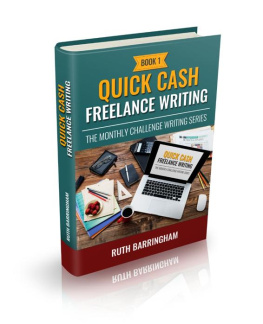
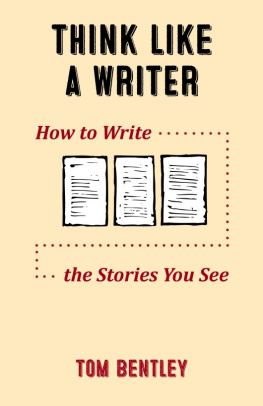
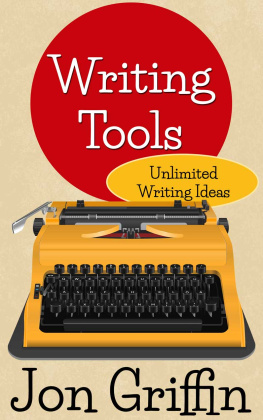
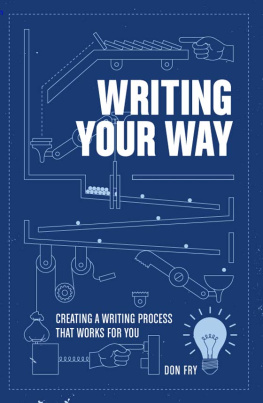
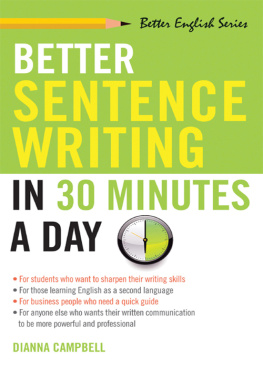
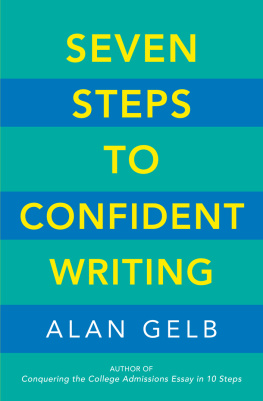


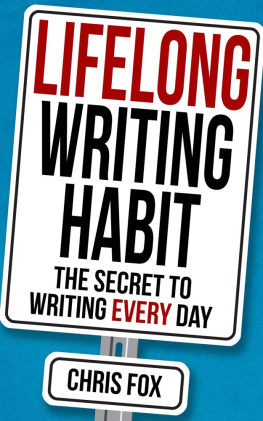
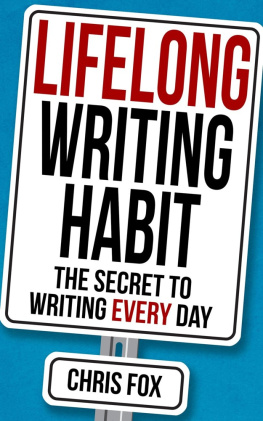
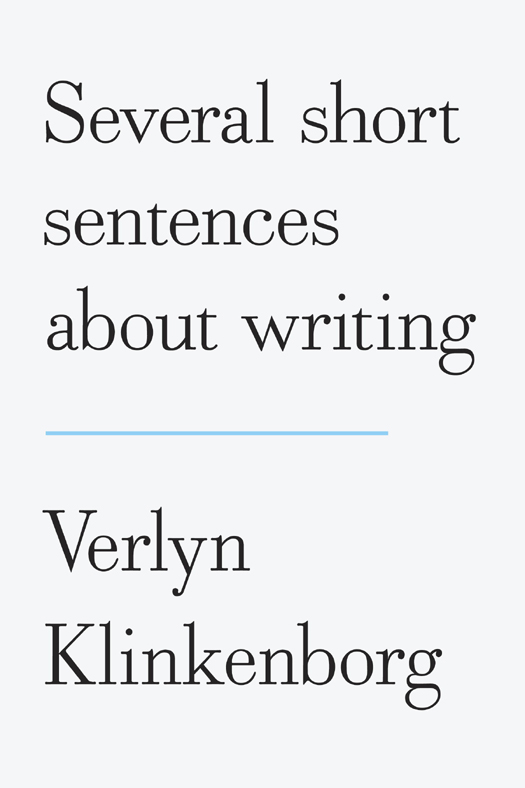
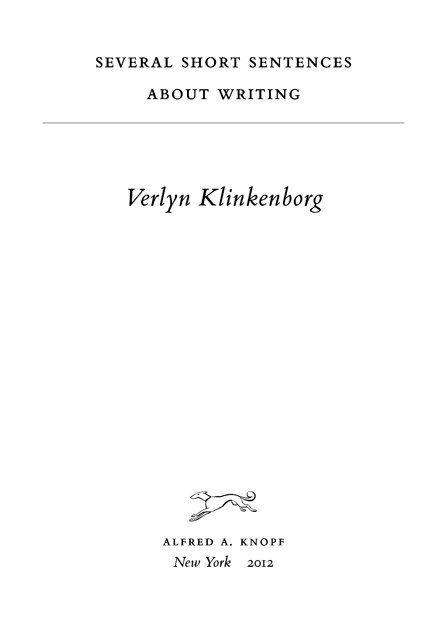
 Short sentences arent hard to make.
Short sentences arent hard to make.